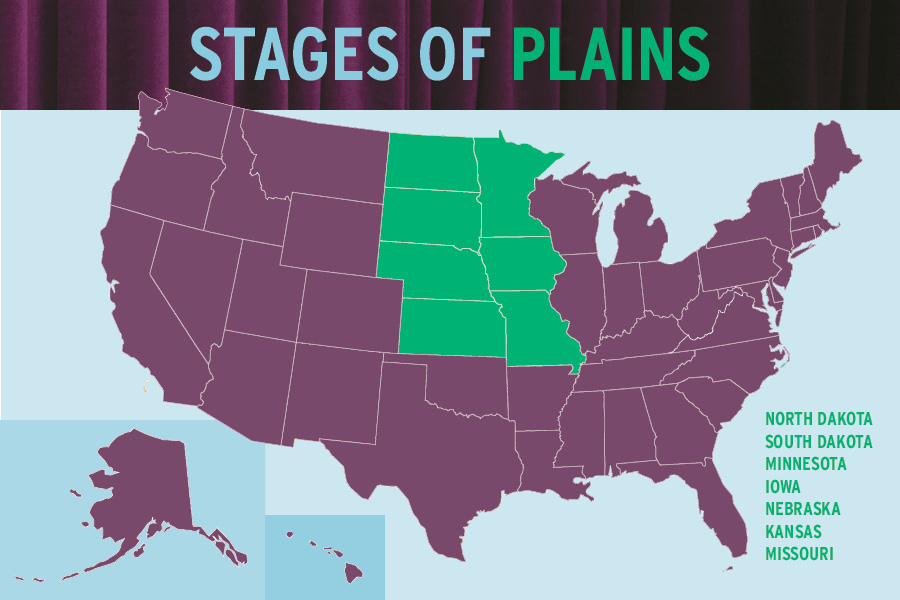With productions on hold in the Plains states and around the world, theatre companies have been forced to reexamine themselves and break out of unconscious mindsets. Their immediate struggles involve recovering financially and trying to help their communities using their art as well as in other ways, but as with theatres everywhere, they also face more fundamental questions.
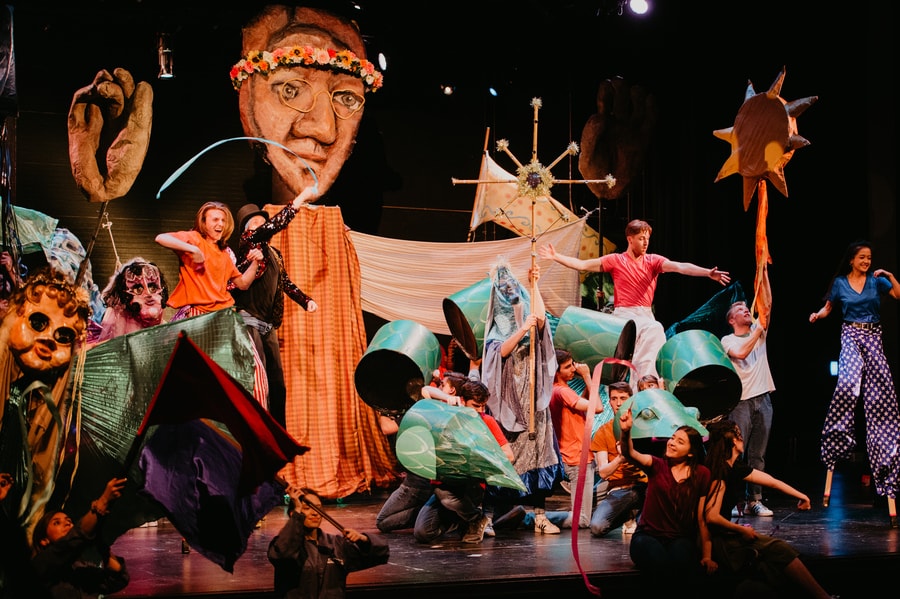
In mid-March, the Nebraska Repertory Theatre in Lincoln paused its production of Pippin, which they were in the midst of rehearsing as COVID-19 spread across the country. Together, the company sang a heart-wrenching rendition of the Act I ballad “Morning Glow” and said their tearful goodbyes, grateful that the company was able to honor all contracts through to April 12 and provide healthcare to all its cast and crew members.
The company has spent the past several months looking for ways to cut spending without having to let go of any staff. Nebraska Rep has the advantage of university funding from the University of Nebraska-Lincoln and a few other key donors. But the university is highly dependent on state funding, which could change with the current scenario.
The theatre views itself as an integral part of any local economic recovery. “We’ve recently adopted a mission to serve as the theatre of all Nebraska and will be pursuing programming that will involve local, campus, and national partnerships,” said Nebraska Rep executive director Christina Kirk. “We need to be collaborating with community support groups, local merchants, and other local and national arts organizations to seek ways to help each other.”
Along with economic recovery, Nebraska Rep also hopes to help the community heal emotionally. In this realm, Kirk said, live theatre has never been more urgently needed. The events of the past months, both COVID and the Black Lives Matter movement, have made the company pause to reflect. It has chosen to postpone two productions planned for this fall and focus instead on devoting its time and resources to an intensive exploration of approaching race in its two theatre spaces as well as in higher education.
This fall it plans to convene a diverse group of artists, writers, collaborators, and Civil Rights leaders in a series of workshops, panels, and listening circles to explore the best path forward for Nebraska Rep, for the university, and for the larger theatre community.
“We recognize, however, that workshops and panels alone will not combat deep-seated patterns of systemic racism,” Kirk said. “We intend to use these venues to understand the systems that contribute to racism and work to reform those systems.”
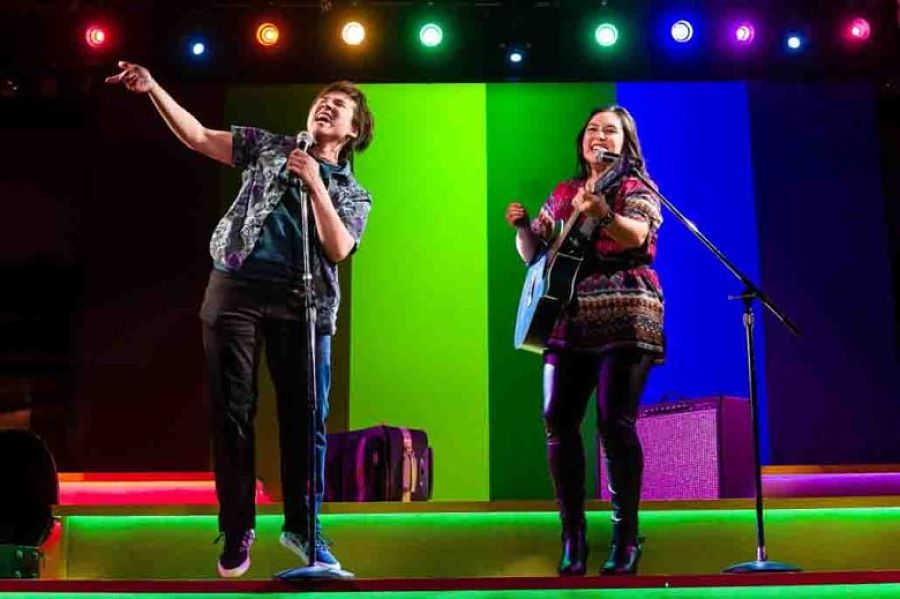
Mixed Blood Theatre was midway through the run of the world premiere of Interstate, by Kit Yan and Melissa Li, which it described as a trans Asian queer musical, on March 16. It had gotten rave reviews but had to close two weeks early. Two months after that, the Minneapolis theatre—and the rest of the world—was shaken by the death of George Floyd less than four miles away.
The incident galvanized the company into action. It commissioned 10 theatre artists to create 5- to 10-minute videos with their response to Floyd’s death and to centuries of systemic racism. It converted its building into a food distribution center, currently feeding 400 families, as South Minneapolis has become a food desert. It also opened up its building for BIPOC and small businesses to operate from, and had a group of its technicians help board up the buildings they had been in previously. A Mixed Blood staff member even organized a community patrol made up of young adults.
In the fall, Mixed Blood hopes to reopen with Tarell Alvin McCraney and Tina Landau’s Ms. Blakk for President, closing the production two days before the November presidential election. The play is about queer activists’ movement to unseat a Republican president who has neglected a virus that unnecessarily kills thousands of Americans. Its text is about Ms. Blakk getting onto the floor of the ’92 Democratic convention in drag with the motto “Lick Bush in ’92.”
“The racism revealed in our city for the world to see must be addressed in the evolution of professional theatre, and that’s a great thing,” said artistic director Jack Reuler. “Mixed Blood’s art will mature into work that always has a call to action, leaving its participants not with catharsis but with recognition that arts and activism are wed.”
Reuler believes that COVID-19 is a great disrupter, and it allows Mixed Blood the opportunity to reexamine its art form, discover habits that need reinvention, and help move to whatever comes next. Finances and facilities are no longer the only, or even the main indicators of health or strength, he said. Adaptability is the new sustainability.
“Mixed Blood is too stubborn to go away,” he said. “We will survive the pandemic with values and finances intact.”
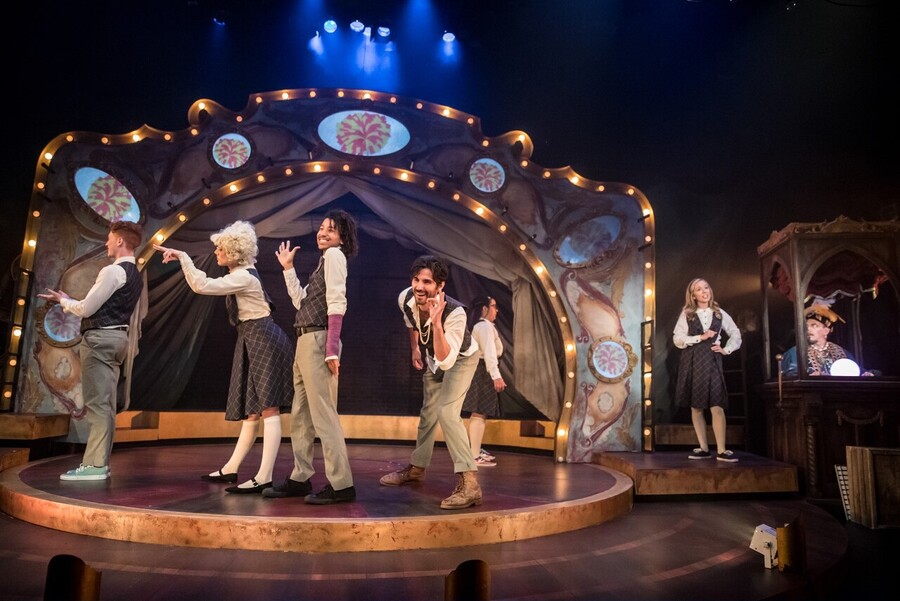
The Jungle Theater was all set to open its production of Redwood by Brittany K. Allen. The production had been expensive, and the Minneapolis company was hoping to earn back some revenue, only to have to shut down the show on March 13.
But more radical changes have occurred since then, with the death of Floyd taking Minneapolis by storm, and people taking to the streets to denounce systemic racism. “This is a time that is exposing many inequities,” said Jungle’s interim artistic director, Christina Baldwin. “My fear is that if we try to return to ‘normal,’ our aim is too low. We must aim to do much better than that.”
At the moment, the theatre is doing its best to prioritize its people over everything else.
“We’ve furloughed our production stage manager, but aside from that, we’ve been lucky enough to maintain our core full-time staff so far,” said managing director Robin Gillette. “And ‘lucky’ is perhaps not the right word—we prioritized keeping staff because we fundamentally value our people and must act to protect them.”
The theatre desperately wants to come back strong when the time is right, and these people are essential to that. While the timing of the shutdown was devastating for its production cycle, the timing was better in terms of incoming grant revenues. The Jungle receives contributions from certain donors in May every year, and other funders were able to advance their payments or make grant restrictions more lenient. They were also able to apply for local funding, which they used to support artists and crew who lost work due to the pandemic.
“We are in a time of great change and evolution,” Baldwin said. “We have an opportunity before us to reexamine systems that were not working for everyone.” She said the Jungle’s immediate goal is to find opportunities for its artists, designers, and technicians to keep telling stories.
“The Jungle stands in solidarity with the Black community, we are committed to the path toward anti-racism, and we can and must do better,” said Baldwin. “Given what we’ve witnessed here in the Twin Cities over the past weeks (and for decades before that), predominantly white organizations like the Jungle need to accompany action with words. This is a time of transition for the Jungle, and transformation for our community. Our goal is to make our world safer, not only in the response to the pandemic of COVID-19, but the ongoing pandemic of anti-Black violence and oppression.”
This new path for the Jungle includes commissions for audio plays and a festival that gives a platform to BIPOC community organizations. While the reality of COVID-19 makes doing business at all complicated, the theatre is working on new ways to connect with audiences, including outdoor projections, window displays, and video installations.
“We need change, and we need to give credit to the change makers,” Baldwin said.
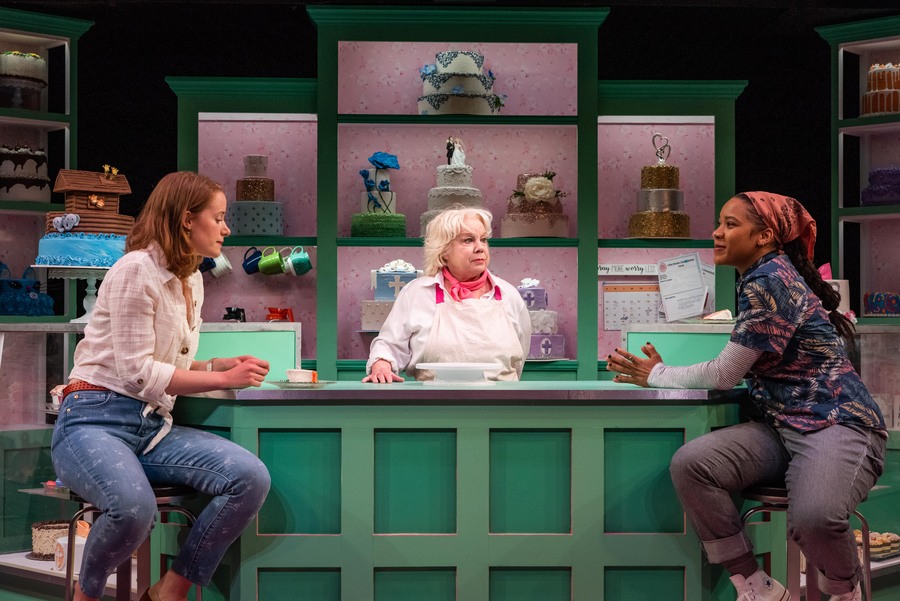
The Repertory Theatre of St. Louis had been busy before the lockdown. They had just opened their final studio season of the show The Cake written by Bekah Brunstetter and were moving into tech rehearsals for their final mainstage show, which was to be the world premiere of Dreaming Zenzile, based on the life of Miriam Makeba, by Somi Kakoma. They had also announced a 2020-21 season and a new venue, which they were using to expand their tech and preview process.
Finally, they had expanded with their new-play festival, an expanded and reimagined edition of the previous new-play program, titled Ignite. The new program was to have a new name and a new focus on plays in various stages of development. St. Louis Rep planned to collaborate with other local artistic organizations and organize it.
As COVID-19 brought these activities to a grinding halt, the theatre’s first priority was the health and safety of their staff and community, closely followed by the preservation of the organization and ability to meet the needs of the community. Like so many, St. Louis Rep’s staff and board have been deep in scenario planning, balancing the conditions on the ground, the necessary safety concerns for artists, staff, and patrons, as well as the financial viability of running a season under these conditions.
While St. Louis Rep has received support from donors as well as the Paycheck Protection Program, this has been one of the most challenging times the theatre has ever seen financially. They have had to make painful adjustments; most of their part-time staff are contract workers, and the theatre can’t renew those contracts until live performances begin again.
“In the event that we are unable to have in-person productions before the summer of 2021, the impact on staff positions and salaries would be significant,” said Hana S. Sharif, the theatre’s artistic director.
At present, the hope is to reopen in December 2020 with A Christmas Carol, though they won’t be able to nail down that plan officially until September. In the event that they do reopen, they have already made plans to implement social distancing, sanitizing procedures, face coverings, temperature checks, and more in order to best protect all staff, artists, and patrons.
The pandemic has made the theatre introduce a few long-term changes. They see a need to change their subscription model, for one, and to explore more opportunities for flexible ticketing and scheduling, as well as finding virtual and streaming options, even after live performances are up and running again.
“Perhaps most urgently, the situation has highlighted the vulnerability of the freelance artist,” said Sharif. “It will be interesting to see how organizations might adapt to sustain artists in ongoing ways that include them in support systems like healthcare and salaries. We are seeing that if we do not take these leaps, we will lose brilliant minds from the industry who simply have to make survival-based choices.”
Shrishti Mathew is a Magazine, Newspaper, and Online Journalism graduate student at Syracuse University.
Creative credits for production photos: Interstate by Kit Yan and Melissa Li, directed by Jesca Prudencio; Ride the Cyclone, book, music, and lyrics by Jacob Richmond and Brooke Maxwell, with additional material by Alan Schmuckler, creative consulting by Rick Boynton, directed by Sarah Rasmussen, with music direction by Mark Christine, with choreography by Jim Lichtscheidl, scenic design by Chelsea M. Warren, lighting design by Marcus Dilliard, sound design by Sean Healey, costume design by Trevor Bowen, wig and makeup design by Paul Bigot, projections design by Kathy Maxwell, properties by John Novak; The Cake by Bekah Brunstetter, directed by Sara Bruner, with costume design by Ulises Alcala, lighting design by Robert Denton, and sound design by David Van Tieghem

